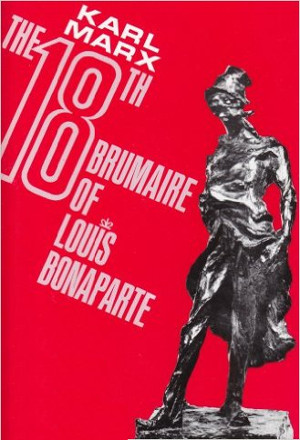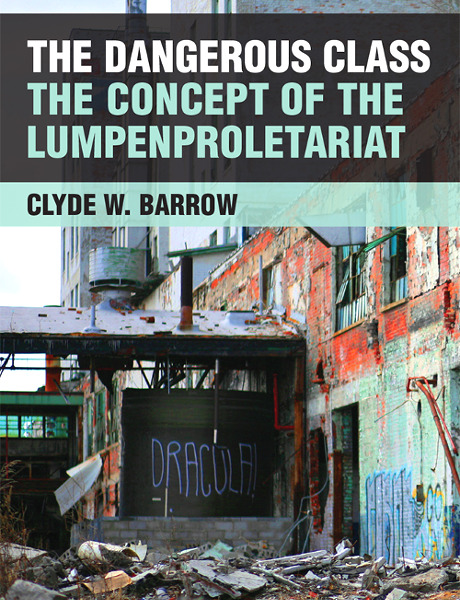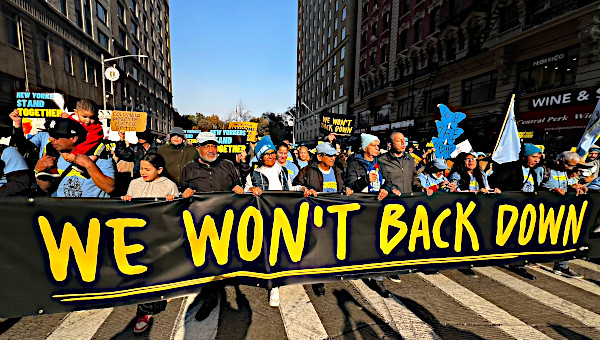Donald Trump: A New Emperor of the Lumpenproletariat?
In The Dangerous Class: The Concept of the Lumpenproletariat (University of Michigan Press, forthcoming 2020), I argue that US President Donald Trump should be understood as a “Prince of the Lumpenproletariat.” The question that will confront us on November 3rd and long afterward is whether Donald Trump will become “Emperor of the Lumpenproletariat.” These terms are taken from Karl Marx’s 18th Brumaire of Louis Bonaparte, where he applied them to Louis Bonaparte III. I argue that Trump has followed the script of the 18th Brumaire, which is the story of the exceptional rise to power of a lumpenproletariat organized and led by an authoritarian populist.
Marx described Louis Bonaparte III as an authoritarian dictator:
“who constitutes himself chief of the Lumpenproletariat, who here alone rediscovers in mass form the interests which he personally pursues, who recognises in this scum, offal, refuse of all classes [i.e., the lumpenproletariat] the only class upon which he can base himself unconditionally… An old crafty roué, he conceives the historical life of the nations and their performances of state as comedy in the most vulgar sense, as a masquerade where the grand costumes, words and postures merely serve to mask the pettiest knavery… the serious buffoon who no longer takes world history for a comedy but his comedy for world history.”1
In his preface to a second edition of the 18th Brumaire, Marx observed that the purpose of his book had been to “demonstrate how the class struggle in France created circumstances and relations that made it possible for a grotesque mediocrity to play a hero’s part.” It is no coincidence that the cover of Time (June 18, 2018) features an image of Donald Trump looking at his reflection in the mirror and seeing a king reflected back in the mirror. The July 4, 2018 New York Daily News portrays Trump as “the clown who plays King.” The language used to describe the Trump Administration as a theatrical but dangerous “clown show” played out on a world stage is remarkably similar to Marx’s description of Louis Bonaparte in the 18th Brumaire.
Longing for Greatness, Again
In the 18th Brumaire, Marx chronicles the defection of the peasantry and the urban petite bourgeoisie from the February Revolution of 1848, because even though they were “working classes,” they were also small proprietors whose commitment to private property made them leery of the more radical demands for a social republic put forward by the industrial proletariat in the ensuing June Days. These classes were not only threatened by the ‘socialistic’ demands of the proletariat; they were also nostalgic for an older capitalism based on local small producers and small farmers (peasants), who had flocked to the armies of Emperor Napoleon I – a dictator who had once made France great for them. As Marx observed, the urban and rural petit bourgeoisie longed to make France great again.
In the 18th Brumaire, Marx also identified numerous fractions of the bourgeoisie, which was far from unified in its preferred response to the revolutionary proletariat and even in its commitment to a republic in any form. The bourgeoisie, as Marx defined it, included large landowners (real estate), the finance aristocracy (bankers), large industrialists, and the professions – senior officers of the army, university intellectuals, priests, lawyers, and the press. The division of interest within the bourgeoisie, and the nostalgic longings of the peasants and the petite bourgeoisie, set the stage for Louis Bonaparte’s election as president of the Second Republic in December 1848. However, with little support in the French National Assembly, and facing the prospect that he would have to leave office due to a likely electoral defeat in 1854, Louis Bonaparte staged a coup d’état on December 2, 1851, with the support of army officers, who led the Mobile Guard and then the Society of 10 December, and the approving acquiescence of the finance aristocracy.
Bonaparte had initially won an election with support from the finance aristocracy and the votes of the rural and urban petit bourgeoisie, who were swayed by his promise to reduce their taxes and his pledge to make France great again. However, Bonaparte’s coup d’état ultimately relied on the mass support and violence of the lumpenproletariat. Marx and Engels did not consider the lumpenproletariat capable of independent political action, because of its dependent position at the margins of capitalism. Thus, when the lumpenproletariat does become politically active, it is often because it has been organized into in the political arena by other classes, although the lumpenproletariat is usually brought into the class struggle by the ruling class as a counterweight to the proletariat’s superior numbers. The ruling class will most often enlist the lumpenproletariat as “bribed tools of reactionary intrigue” by enrolling them in counterrevolutionary militias and special police forces directed against the working class. A uniform, a steady salary, medical care, a pension, and a gun are an appealing “bribe” to someone whose “conditions of life” offer no prospects for the future.

When Louis Bonaparte was elected President of Second Republic, he first relied on the Mobile Guard, which was the military arm of the Republican Provisional Government. Bonaparte disbanded the Mobile Guard and replaced them with a secret society called the Society of 10 December – the Decembrists – which had been organized by military officers seeking to ensure the election of Louis Napoleon as president of the Republic of France on December 10, 1848. Marx describes the Mobile Guard (and later the Decembrists) as belonging:
“for the most part to the lumpenproletariat… a recruiting ground for thieves and criminals of all kinds, living on the crumbs of society, people without a definite trade, vagabonds, gens sans feu et sans aveu, varying according to the degree of civilisation of the nation to which they belong, but never renouncing their lazzaroni character.”2
Bonaparte’s coup d’état was made possible by the armed support of the lumpenproletariat and it was tolerated by the finance aristocracy so long as the latter class was allowed to pillage the state treasury with mounting public debt and corrupt financial schemes – “the pettiest knavery” pursued openly in public view, while the petit-bourgeoisie is quite literally lulled into a narcotic coma with promises of making the nation great again. Similarly, Trump promises to return the United States to its traditional (if mythical) way of life – white men working good jobs in mines and factories, intact nuclear families, Protestant religious values, and manifest destiny.
There is nothing new about the reactionary and nostalgic longings of the American petit-bourgeoisie, which has always suffered from what Richard Hofstadter called status-anxiety when squeezed by economic power of corporate and finance capital and the demands of a proletariat demanding higher wages and more public services (e.g., universal healthcare, free higher education). What is new in the United States, however, is the rise of a white lumpenproletariat, which now similarly is moved by nostalgic masculine images of a time when American men mined iron ore, oil, copper, coal, and bauxite from American soil, built automobiles sold around the world, and built military and civilian aircraft that dominated the world’s skies. Some political economists still call this class a deindustrialized proletariat, but the problem with the latter term is that these ‘masses’ are no longer a proletariat and they never will be again in their lifetimes. They have fallen into the ranks of the lumpenproletariat and, as Marx wrote in The Communist Manifesto, they have become “the ‘dangerous class’, the social scum, that passively rotting mass thrown off by the lowest layers of old society may, here and there, be swept into the movement by a proletarian revolution; its conditions of life, however, prepare it far more for the part of a bribed tool of reactionary intrigue.”

Under President Donald Trump, there has been a massive expansion of special federal police forces with paramilitary capabilities and they are profoundly loyal to the president. One can substitute Immigration & Customs Enforcement (ICE), Customs & Border Protection (CBP), and Homeland Security Investigations (HSI) for the Mobile Guard.3 The Southern Poverty Law Center has identified 165 armed militia groups in the United States, including the Oath Keepers and the 3 Percenters, and this tally does not include numerous run-of-the-mill thugs like Patriot Prayer and the Proud Boys. Donald Trump has an army of lumpenproletarian shock troops that he can activate on “December 2” to raise himself from the status of Prince to Emperor. President Trump has long boasted that his own security team is “rough” with those who challenge him and he encourages local police to not to be concerned about preventing physical harm to people being taken into custody.4
Meanwhile, the President’s HSI “jump out boys” whisk away protestors in unmarked vehicles with no official markings to identify them as law enforcement officers.5 President Trump refers to armed neo-Nazis, fascists, and white supremacists as “fine people” and he hints that civil war is looming by claiming that “I have the support of the police, the support of the military, the support of the Bikers for Trump – I have the tough people, but they don’t play it tough – until they go to a certain point, and then it would be very bad, very bad.”6
This is the script of the Eighteenth Brumaire. This is the Chief of the Lumpenproletariat, who gleefully declares that “I love the poorly educated!”7 Yet, from the standpoint of class analysis, it is therefore important to recognize that the mere act of removing Donald Trump from the Office of the President will not reverse the underlying logic of post-industrial capitalist development that has led to the rise of an angry and violent white lumpenproletariat. Donald Trump did not cause the white lumpenproletariat, although his words and actions have mobilized and unleashed them in a variety of alt-right, neo-Nazi, fascist, and white nationalist organizations, including armed militias that will probably become more active if Trump is denied the presidency.
The emergence of a white lumpenproletariat is the result of a long-term process of class formation that has generated an army of counter-revolutionary shock troops that will not disappear because of an election. The lumpenproletariat is armed and dangerous and, consequently, no matter the outcome of the 2020 election, a question will remain as to what is to be done with the white lumpenproletariat? In case you are wondering, The Dangerous Class is a pessimistic book and it does not have a happy ending – at least not in the foreseeable future. •
Endnotes
- Karl Marx. “Eighteenth Brumaire of Louis Bonaparte,” in Marx-Engels Collected Works, (London: Lawrence and Wishart, 1979), Vol. 11, pp. 149-50. Elsewhere, Karl Marx, “189 Marx to Engels in Manchester [London] 12 October 1853,” in Marx-Engels Collected Works (London: Lawrence and Wishart, 1983), Vol. 39, p. 388 refers to Louis Bonaparte as “the lumpenproletarian emperor.”
- Karl Marx, “The Class Struggles in France, 1848 to 1850,” Marx-Engels Collected Works, Vol. 10 (September 1849-June 1851), p. 62. Italics added by author. Cowling, “Can Marxism Make Sense of Crime,” p. 59 correctly concludes that Marx and Engels “associated crime with the lumpenproletariat,” but only to the degree that it is a “recruiting ground for thieves and criminals of all kind,” but they do not view the lumpenproletariat, as a whole, as a criminal underclass.
- Mitchell Ferman and Manny Fernandez, “In the Rio Grande Valley, the Border Patrol is the ‘Go-To’ Job,” New York Times, April 14, 2019.
- Philip Bump, “Trump’s Speech Encouraging Police to Be ‘Rough’, Annotated,” The Washington Post, July 28, 2017.
- Baynard Woods and Brandon Soderberg, “Think Federal Cops in Portland are Scary? Cops Use ‘Jump Out Boys’ All the Time,” The Guardian, July 29, 2020.
- David Jackson, “Donald Trump Stirs Controversy with Breitbart Interview About His ‘Tough’ Supporters,” USA Today, March 15, 2019.
- Dylan Stableford, “Donald Trump: I Love the Poorly Educated,” February 24, 2016, YahooNews.com.; Maya Oppenheim, “Jared Kushner ‘Admitted Donald Trump Lies to His Base Because He Thinks They’re Stupid,” The Independent, May 31, 2017.






